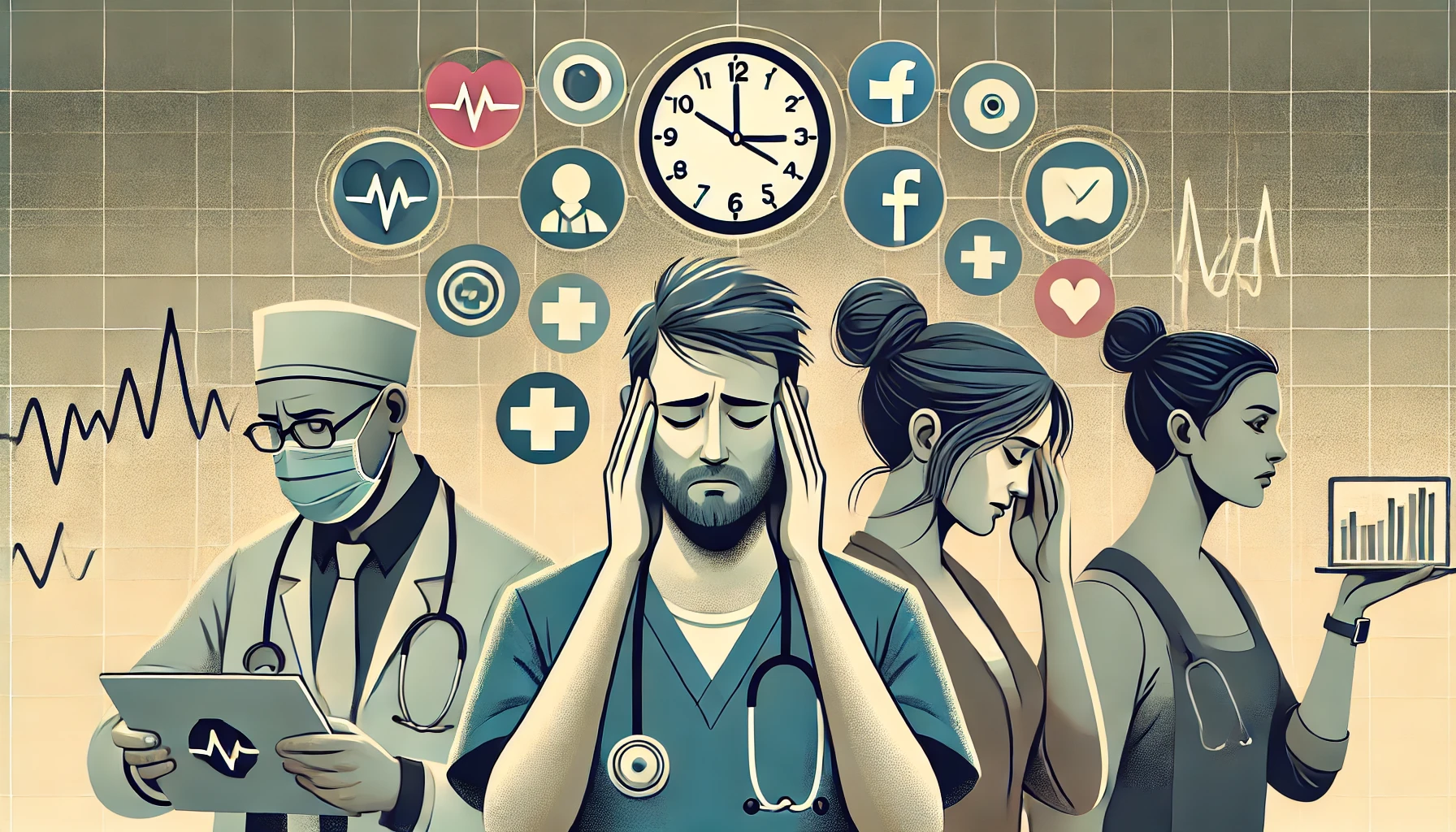Professions Under Pressure: The Stress Spectrum and Social Media Outbursts
Dive into the unique stressors faced by healthcare workers, teachers, and tech professionals, and how their struggles manifest online as social media outbursts.
Table of Contents
Introduction: A Spectrum of Stress
In today’s world, certain professions are renowned for their high stress, long hours, and the emotional toll they take on those who work in them. From teachers dealing with underfunded schools to tech workers facing non-stop innovation cycles, the link between occupation-related stress and mental health struggles is becoming clearer. As these stresses reach a boiling point, they often spill into social media—sometimes in ways that result in aggressive or impulsive online behavior. But there’s a deeper story here, one that speaks to how work stress manifests on a spectrum, affecting each person uniquely.
Healthcare Workers: The Strain of Saving Lives
Healthcare professionals, particularly nurses and emergency room doctors, face intense levels of stress. In the U.S., a 2019 study by the American Psychological Association found that nearly 60% of nurses and 45% of physicians reported symptoms of burnout, a state of chronic physical and emotional exhaustion.
The stressors in healthcare are unique. Doctors and nurses are often required to make split-second decisions, literally carrying the weight of life and death. The COVID-19 pandemic only amplified this, as healthcare workers dealt with unprecedented caseloads, limited resources, and personal health risks. By 2021, these stresses reached critical levels, and many healthcare workers turned to social media to express their exhaustion and frustrations.
But here’s where the story turns: as these professionals took to platforms like Twitter to vent, their posts were sometimes met with criticism rather than empathy. Public outbursts from doctors lamenting anti-mask sentiments or from nurses sharing stories of burnout sparked heated discussions. Many of these workers found themselves under fire, accused of “unprofessionalism” or “fearmongering.”
This phenomenon highlights the disconnect between the perception of healthcare workers as invincible caretakers and the reality of their very human vulnerabilities. In recent years, mental health advocates have called for a more compassionate approach to interpreting these online expressions of frustration, recognizing them as cries for help rather than judgments of character.
Teachers: Frontline Workers of the Mind
In many ways, teachers are on the frontlines of societal change, balancing the emotional needs of students with academic goals and dealing with issues like underfunding, overcrowded classrooms, and, in some cases, hostility from parents. This combination of high emotional labor and limited support makes teaching one of the most stressful professions today.
In 2020, a survey by the National Education Association found that 70% of teachers reported significant stress, with many citing social media as both a source of support and criticism. Platforms like Twitter and Facebook became sounding boards where teachers could share their frustrations, yet, much like healthcare professionals, they faced backlash. The public and policymakers often interpreted their complaints as a failure to adapt or a lack of dedication.
One notable example occurred in late 2021 when a group of teachers in California formed a social media campaign to highlight the mental health struggles educators were facing due to remote learning demands. Their posts—often desperate calls for understanding—were met with polarized responses, with some applauding their bravery and others accusing them of lacking resilience. The incident underscored the need for a nuanced understanding of stress and mental health, particularly in professions with intense emotional demands.
Technology Sector: The Rise of “Always On” Anxiety
In the fast-paced tech industry, employees experience the constant pressure to innovate and stay ahead of the curve. Known for long hours and a culture that glorifies “grind mentality,” the tech world sees high levels of burnout, particularly among developers and product managers.
A study by Blind, an anonymous professional social network, revealed that 57% of tech workers from top companies like Google, Facebook, and Amazon reported feeling burnt out in 2020. For many of these employees, social media became an outlet to discuss the challenges of balancing personal well-being with relentless deadlines.
But when a Google engineer took to Twitter to share his experience of working 100-hour weeks, the response was divided. Some sympathized, while others criticized him for complaining about a “dream job.” His posts sparked a wider conversation about the hidden costs of high-paying tech roles and the toll they take on mental health.
These public posts also underscored a cultural shift in the tech world. As tech giants encourage workers to “bring their whole selves” to work, employees increasingly feel justified in airing grievances online. However, this exposure comes at a price, as many are labeled ungrateful or weak for expressing frustration in a sector that’s often idealized for its perks.
The Retail and Service Industry: The Underappreciated Workforce
In the retail and service industry, stress comes from a different source. Workers in these fields often face demanding customers, low wages, and minimal job security. The mental toll of dealing with customer complaints and long hours, especially during holidays, has driven many service workers to social media, where they find solidarity and validation in shared experiences.
In 2018, the hashtag #TargetBreakroom trended on Twitter as retail workers began sharing photos and stories from their break rooms—safe spaces where they could catch a breath amidst the chaos of customer demands. While some posts were humorous, others hinted at deeper frustration and mental exhaustion.
Despite this, retail workers who share their struggles on social media often face judgment from the public, with criticisms such as, “That’s part of the job” or “It’s not a real career.” These responses overlook the reality that service industry stress can be as severe as in other high-stress professions, particularly when workers lack access to mental health resources.
The visibility of these posts has fueled a new advocacy movement, encouraging more empathy for service workers and pushing for better mental health support. A recent campaign by the Retail Workers Union highlighted the toll of customer service on mental health, sparking discussions around fair treatment and understanding for workers in this underappreciated field.
The Stigma and the Solution: Moving Toward Empathy
Across these professions, there’s a clear pattern: job-related stress manifests online, and society often misunderstands or even condemns it. In 2022, the American Psychological Association launched a campaign to educate the public on mental health in the workplace, urging people to consider how unaddressed mental health issues might influence behavior, especially online.
Advocates argue that recognizing these struggles as symptoms of broader mental health challenges, rather than personality flaws, is crucial for creating a more compassionate online environment. Movements to increase mental health support in workplaces are growing, with major corporations implementing wellness programs and social media platforms pledging to promote mental health awareness.
In Part 3, we’ll explore the journey toward accountability and understanding on social media, examining how companies, advocacy groups, and individuals are working to shift the narrative from blame to empathy.
References
-
How stress affects your health by American Psychological Association
An overview of how stress impacts health, with insights applicable to healthcare professionals. APA
-
Getting Serious About Teacher Burnout by National Education Association
Addressing the critical issue of educator burnout and its impact on mental health. NEA
-
Burnout and stress are everywhere by American Psychological Association
An exploration of burnout across various professions, including the tech industry. APA

